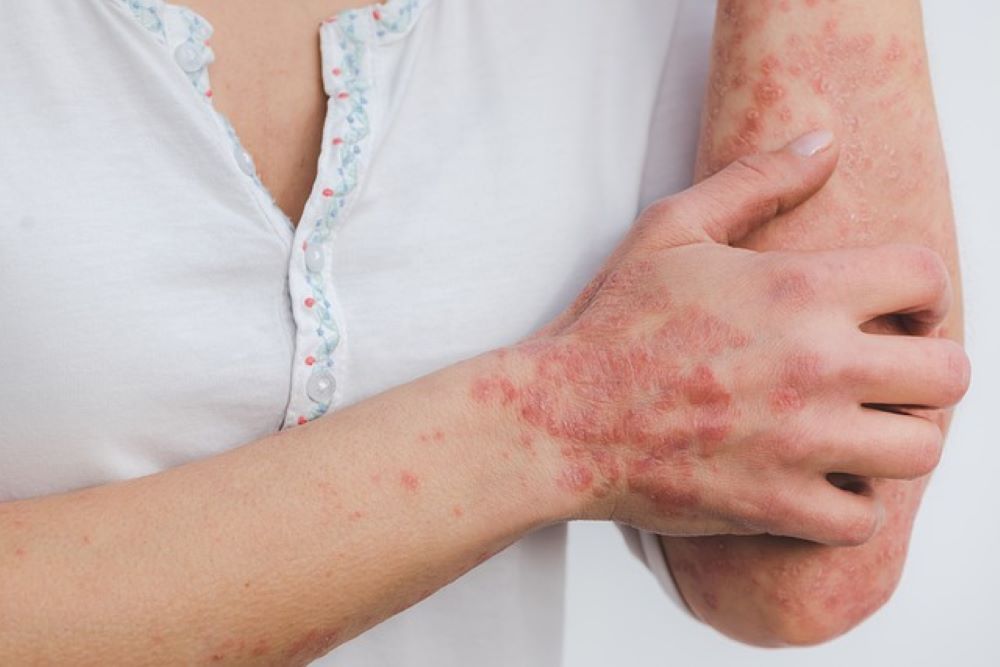Psoriasis is a chronic autoimmune condition that causes thick, scaly patches by accelerating the skin’s natural cell renewal process. The immune system becomes overactive in this situation, speeding up the growth of skin cells.
Skin cells typically go through a complete cycle of growth and shedding in a little over a month. However, in psoriasis, this process happens in only three to four days. As a result, the extra skin cells don’t shed normally and instead accumulate on the skin’s surface [1].

Image source: pixabay.com
Do you recognize specifics that come with psoriasis?
Psoriasis patients frequently feel stinging, burning, and itching on the affected areas [1]. Various triggers, such as skin injuries, throat infections, and certain medications, can initiate or worsen psoriasis symptoms. The condition can affect any part of the body, however it is most common on the elbows, knees, and scalp. But importantly, psoriasis is not contagious and cannot be transmitted from person to person [2].
How hard is it to choose cosmetics?
Choosing psoriasis-friendly cosmetics can be difficult, since it is vital to pay attention to the components that each cosmetic contains. It may turn out that the ingredient that is supposed to alleviate the symptoms of psoriasis is not good for our health. Zinc Pyrithione (ZPT) is one such component with strong antibacterial activity against pathogenic microorganisms.
The stimulating molecules in ZPT improve the effectiveness of care for dry, cracked, and flaky skin. However, due to the potential health risks, the EU recently announced a ban on further ZPT use in cosmetic products [3]. You can also read what effects of ZPT we observed in our experimental study.
But don’t worry, there are many other cosmetics with helpful elements accessible in pharmacies, drugstores, and supermarkets. Look for skin softening products and moisturizers, since during the intermediate stages or periods of remission, moisturizers and skin softening treatments are especially effective [4].
Hydration is key for psoriasis-prone skin, it can help soften the skin and prevent any symptoms from getting worse, so choose products with moisturizing ingredients to maintain skin health [5, 6]. Moisturizers enriched with natural moisturizing factors (NMFs) improve skin hydration by attracting and binding water. Advanced moisturizers may contain active ingredients like glycerol, enhancing moisture in deeper skin layers [4].

Image source: pexels.com
However, it is very good to know…
Using natural oils and water instead of heavy creams with various chemical substances can be a gentler and more natural approach for some individuals with psoriasis. However, it’s important to note that the effectiveness of this method can vary from person to person, as psoriasis is a complex and individualized condition.
Many natural oils, like almond and hemp oil, can provide moisturizing and soothing properties since they are often rich in essential fatty acids and vitamins that nourish the skin and promote its health. In addition, water helps hydrate the skin and can be used to cleanse and moisturize affected areas.
GS tip: If you decide to try this approach, it’s crucial to patch test any new oil on a small area of your skin to check for possible allergic reactions or irritations. Additionally, it’s always best to consult with a dermatologist or healthcare professional before making significant changes to your skincare routine.
Prioritize Gentle Formulations
Cosmetics is not usually formulated with ingredients that specifically benefit people with psoriasis. As a result, people with psoriasis should choose their cosmetics carefully to avoid irritation or exacerbation of their symptoms. Some cosmetic ingredients may aggravate or irritate psoriasis symptoms. People with psoriasis should avoid purchasing cosmetics that contain specific chemicals and ingredients, like:
GS tip: Living with psoriasis does not require you to forego cosmetics. You may maintain healthy and comfortable skin while using cosmetics by understanding your skin’s needs, avoiding potential irritants, and choosing products developed for sensitive skin. It is best to speak with a dermatologist for specific advice and product suggestions. Individuals with psoriasis can effectively maintain their skin while feeling comfortable and confident with the correct cosmetic choices and skincare routine.
Sources
[1] National Psoriasis Foundation: About Psoriasis, https://www.psoriasis.org/about-psoriasis (accessed in June 2023).
[2] NHS: Overview – Psoriasis, https://www.nhs.uk/conditions/psoriasis/ (accessed in June 2023).
[3] Ou W., Shen J., Zhong J., He J., Lei D., Li H., Chen Y., Wang C., Wu H., Zhou B., Tang X., Fan Y., Lu J., Li Y.Y. (2023): Rapid on-site detection of zinc pyrithione in real-life samples with unprecedented selectivity and sensitivity. Sensors and Actuators B: Chemical, 378, 133129.
[4] van Zuuren E.J., Fedorowicz Z., Christensen R., Lavrijsen A.P.M., Arents B.W.M. (2017): Emollients and moisturisers for eczema. Cochrane Database of Systematic Reviews, 2: CD012119: https://www.cochranelibrary.com/cdsr/doi/10.1002/14651858.CD012119.pub2/full (accessed in June 2023).
[5] Medical News Today: Psoriasis makeup tips: Ingredients and application, https://www.medicalnewstoday.com/articles/psoriasis-makeup#beneficial-ingredients (accessed in June 2023).
[6] My Psoriasis Team: Horowitz D.M., Menard V.: Best Makeup and Cosmetics for Psoriasis: https://www.mypsoriasisteam.com/resources/best-makeup-and-cosmetics-for-psoriasis (accessed in June 2023).



Wow! I didn´t know that….